- Home
- Scott Chapman
The Templar Key, By Number One Author (Peter Sparke Book 3) Page 10
The Templar Key, By Number One Author (Peter Sparke Book 3) Read online
Page 10
His gaze ran along the stone columns that supported the roof over the passageway, and stopped dead.
“Now I didn’t expect to see that.”
“What is it?” said Tilly.
Sparke shone his torch at the nearest column. Neatly embedded in the stone was an iron girder, lightly rusted, but obviously in great condition. Embossed on the side of the girder was the manufacturer’s trade mark.
“Springburn Iron Works, Scotland,” read Sparke, aloud.
“If you like that, you’ll love this,” said Tilly, standing at a broad opening in the stonework looking down into the water. Her hand rested on an iron framework that supported the rock above. She ran her finger along the iron and read.
“Drysdale-Behier and Co. Ltd.”
“Maryam will give you a medal,” smiled Sparke. Tilly smiled back.
“Certainly suggests that the family had a strong connection with the Monastery, which is a little strange as I’m pretty sure she said the family was from Calvinist backgrounds. Swiss and Scots, didn’t she say?”
Tilly began photographing the main areas of the Monastery, taking notes occasionally.
“The helicopter is due back about now, I think,” Sparke said, and almost immediately the thudding noise of rotors filled the stone amphitheater.
Tilly and Sparke clambered back down the rickety ladder and strolled towards the aircraft. Sparke looked at his watch and spoke to the pilot.
“We’re not in any big rush, are we? It would be good to follow the old road from here directly to the coast.”
Sparke showed him on a map roughly where he wanted to go and the pilot nodded.
The flat valley narrowed quickly as the helicopter flew uphill. There had been a pilgrim road here for generations, but now it was used only by the occasional four-wheel-drive vehicle as the new road, which looped around the hills, took any traffic miles away.
As the land began to be pinched in by the hills on either side, the slope steepened so that soon the landscape formed a tight, high pass. Below them, the grey-brown earth rolled past. Suddenly, all three people in the helicopter focused on the same piece of ground. It was a building, but not a farmhouse or abandoned barn.
The regular, block shape of the building below looked alien, not just to the jumble of barren rocks that surrounded it, but to almost any other building.
Sparke spoke to the pilot, who had anticipated the request and begun to circle the aircraft round to hover over the building. The ground was too rocky to land, so he slowly drifted back down the hillside until he spotted a flat area broad enough to touch down, leaving Sparke and Tilly a long ten-minute walk back up to the building.
A dry wind blew through the narrow pass, picking up the scent of the rosemary bushes that dotted the land. Breathing the air felt medicinal; it was impossible not to believe that it was, somehow, healthier than normal air.
Despite its apparent age, the building still stood out sharply from the landscape like something that did not belong there. It looked newly-built. Sparke and Tilly walked directly into the center of what was, in effect, a courtyard.
“Old?” said Sparke.
“Twelfth to fourteenth century,” she said without hesitation. “Very western European in style.”
Up close, it was clear that the stone walls were finished to a high degree. To Sparke, it looked as though the stones on the inner wall had been placed so that each one slightly overlapped the one below, making the wall slope slightly inwards. He could not help thinking that the design served the purpose of eliminating any chance that someone trying to scale the wall would find any point of grip.
He walked back through the gate and inspected the outer wall. It was built in exactly the opposite way to the internal wall, with each stone slightly set back against the one it rested on. Climbing up this wall would be comparatively easy as feet and fingers could find purchase.
Reentering the courtyard, Sparke looked up to inspect the top edge of the inward-facing walls. There was a walkway built into the top of the wall, but the edges were cut into a rounded slope so that even if someone could reach the lip of the wall, there was little chance that they could find a grip.
“This building has been built inside out,” said Sparke, “easy to get over the wall on the way in, but very hard to get out of. A prison?”
“I don’t think you’d find that people made prisons with exercise yards in the Middle Ages. They were not thought of as having an enlightened attitude to prisoner welfare.”
“Not a prison, but possibly made to keep people from getting out.”
Sparke looked again at the narrow entrance to the courtyard.
“Are you wondering about the slope of the ground?” said Tilly.
“Yup, the ground inside the courtyard is much lower than the outside ground,” said Sparke, puzzled. “It’s almost as though they wanted the walls to look lower from the outside. Any ideas?”
“There is one potential explanation that comes to mind, and it is not really that far-fetched,” said Tilly. “Between the outer gate and inner gate of some castles of the time there were areas meant to trap attackers who managed to break through the outer gates. The idea was that you couldn’t move forward because of the next set of defenses, and moving backwards meant having to face a retreat across open ground.”
“And staying where you were?” said Sparke, already suspecting the answer.
“Boiling oil was not a Hollywood invention,” said Tilly. “Castles were designed with these traps built in so that the first people through would have an avalanche of burning oil, stones, arrows and anything else the defenders could find to hurl down on them.”
“But how could that make sense?” said Sparke. “Surely everybody knew about those defenses?”
“They must have,” responded Tilly. “I can only assume that the idea was to make sure that everyone on the attacking side would know that breaking through the first line of defense meant almost certain death.”
“The point was to force attackers to avoid the front gates?”
“I think the point was more basic,” said Tilly. “Deterrence.”
Sparke looked at Tilly.
“You think this could have been built as a deterrent?”
“I wouldn’t want to jump to conclusions, but I’d be inclined to say it was built as a piece of military architecture.”
Despite their age, the walls were in excellent condition. Normally, over time walls would be cut into, altered in various ways so that they would show marks from bolts or fixing holes where things had been added and removed as the building changed use. This building appeared never to have been used for any other purpose since it had been abandoned.
These walls were pristine, with one exception. At a dozen spots around the courtyard, the walls seemed to have been scoured or possibly splashed with some sort of acid. Each spot had a clear, circular center with marks showing radiation outward, like the mess left by a broken bottle of milk.
Sparke ran his finger along the surface of the wall at the center of one of these discolored areas.
“Blast marks,” said Sparke. “Looks like someone set off a dozen or so explosions around the inside walls.”
“There is only superficial damage to the walls,” said Tilly, “and if somebody wanted to blow a hole in the walls they wouldn’t have tried to do it in a dozen different spots. Was it an attempt to demolish it, do you think?”
“Pretty poor attempt, if it was,” said Sparke. “The blasts are too high on the wall.”
At the back of the courtyard was a low building block with a flat roof. Inside, a narrow passageway led to a number of bare chambers.
“Not animal pens,” said Sparke, partly to himself. “Part of the Monastery, maybe?”
“Maybe,” said Tilly. “Did you notice that there’s a walkway around the top of the wall, but no staircase leading to it?”
“Have you ever seen anything like this before?” said Sparke.
“The lines, the proportions, the feel of
the place is similar to crusader military architecture, but the actual design is something I have never seen before. I mean, it’s not even a logical design for a military outpost: not enough sleeping space and the walls are too low on the outside to stop people getting in. We should have this place modelled on a 3D system and sent out to some people I know, get their opinions.”
“What is your gut feeling?” said Sparke. “Just between us.”
Tilly knew the risks of discussing intuitions before all the evidence was available, but this was Peter Sparke she was talking to and she now knew him well enough to trust him.
“I think this,” she said, gesturing at the walls, “might be a Killing Ground.”
At the docks
The Royal Navy cruiser nosed its way into Smyrna harbor behind the converted trawler which was acting as a mine sweeper. Bastian struggled to calm himself as the long-familiar outlines of the waterside skyline came into view. It was seven o’clock in the morning, four years and three months since Bastian had last seen this harbor.
Everything he saw spoke to him of desolation. The few ships in the port looked worn out and probably abandoned, the stone wharves were bare of any traffic, and the warehouses that lined it looked like a line of dusty old bottles left in a cellar too long.
The cold November sky was brilliant blue, but the landscape looked to be a uniform grey. Bastian walked along the steel deck of the cruiser to where a group of men stood waiting. There were seven of them in total: a Chief Petty Officer and six volunteers from the crew, whose natural caution about volunteering for anything had been overcome by the desire to escape the monotony of life aboard ship.
“Smarten up. Officer on deck,” said the Chief Petty Officer, whose voice always sounded as though he was shouting, even when he was speaking with a normal voice.
“All set, Chief Petty Officer?” said Bastian, reviewing his new command. The men all looked incredibly young. Their dark blue Navy uniforms were, unusually, accompanied by brilliant white weapons belts and ammunition pouches. Each carried a Lee Enfield rifle and had a bayonet at his hip. Bastian, too, wore a white webbing ammo belt and a holstered Webley revolver.
“All set, Captain,” said the Chief Petty Officer. Among Bastian’s surprises over the last twenty-four hours had been a visit from the Admiral’s adjutant with a flimsy piece of paper - notification of his promotion from Lieutenant Commander to Captain - and a new uniform issued from ship’s stores.
Bastian looked over the men as the Chief Petty Officer read from a clipboard in his hand.
“Cuthbert, Pew, McGrew, Dibble, Grub, Barley.”
Each man snapped to attention when his name was called. They may not have had much experience in carrying rifles, but they looked imposing to Bastian. From the side of the ship, a long gangway was dropped to a motor boat waiting in the calm harbor water. At a nod from Bastian, the Chief Petty Officer ordered the men down the gangway. When they had all clattered into the boat, he and Bastian followed. Already, knots of curious onlookers had gathered on the shore, mostly standing close to the buildings, ready to disappear into the maze of alleyways at a moment’s notice.
Bastian ordered the boat to head for the jetty, used in peaceful times for yachts and pleasure boats. It was a short journey, but by the time they reached land the number of spectators had grown.
The shore party disembarked and the Chief Petty Officer drew them up into a single rank, gave them yet another quick inspection, and then turned to salute Bastian.
“All ship shape, sir.”
Bastian nodded and turned to face the street which led from the harbor up into the city. Despite the growing number of onlookers, the dock area still appeared desolate. Two black crows, used to having the wharves to themselves, hopped along the quayside, unperturbed by the commotion caused by the landing party.
“Best foot forward, lads,” Bastian said.
At this, the Chief Petty Officer ordered the men to attention and the steel-studded shore boots the sailors wore crashed against the stone wharf.
“You heard the officer. Bags of swank!”
Bastian had heard this phrase used scores of times during his time in the Navy, but had never understood what it meant. The men, however, had no such problem and each threw his chest out and seemed to grow an inch taller.
“By the left, quick march,” bellowed the Chief.
The six men stepped forward in unison and, with the Chief at the rear and Bastian marching at their head just to the left, they launched their mission into the town. Between them the eight men had just over two hundred rounds of ammunition and with that they went off to seek the surrender of a Turkish garrison estimated at over three thousand.
Bastian was fairly confident that the Turkish Commander would be found in the old barracks building near the harbor, but chose to get there by a roundabout route, along the main thoroughfare; he was aiming to create impact, but wanted to avoid surprise.
The crashing sound of the boots on the cobblestones brought ever more people onto the streets, and the only thing that tore their gaze away was the sight of the British warship that had appeared in their harbor.
As the column progressed along the main street, they drew level with the building that had held the British Consulate before the war. Bastian drew a deep breath and shouted out an order.
“Eyes, left.”
At this, the men swung their heads sharply to the left and Bastian threw his right hand up in his best parade-ground salute as they marched past.
“Eyes, front.”
A few moments later he gave the command, “Left, wheel.”
The column, now followed by a crowd, marched through a square until they were heading directly towards the main gate of the Turkish barracks. Bastian dropped back a few paces until he was level with the Chief Petty Officer.
“March them straight in and form them up facing the main doorway on the right.”
“Sir,” said the Chief.
The barracks gate was open, but two sentries and a young officer stood outside, astonished at the spectacle of the approaching sailors. As they neared the entrance, Bastian marched up to the Turkish officer, came to attention and saluted, as his men marched straight past and into the barracks parade ground. Unaware of what else to do, the Turkish officer returned the salute. Bastian nodded calmly to the officer and marched through the gate to where his column had been drawn up. He came to attention in front of them, facing the main entrance to what, he fervently hoped, was the military command for the city.
The Officer of the Guard, aware that he might have done something very stupid by not stopping a group of armed men entering the barracks, sprinted into the building. The crowd of civilians who had followed Bastian’s column was being held back at the gate by the Turkish sentries. In the buildings surrounding the parade ground, dozens of Turkish soldiers began appearing at the windows, looking down at the group of men in Navy blue uniforms. The pristine condition of the Navy uniforms and the parade-ground discipline looked alien to the defeated Turks. The brilliant white ammunition belts and highly shone boots were from another world.
Bastian turned to his Chief Petty Officer and had him stand the men at ease.
“What if their commander is not at home, sir?”
“Well,” said Bastian, looking around, “there are eight of us. We’ll occupy the place.”
After ten minutes the front door of the main building became a bustle of activity and a group of Turkish officers appeared. At the lead was the General, a tall gaunt figure with his greatcoat draped over his shoulders. He looked at Bastian and his men as though they might have been noisy children.
Bastian snapped to attention and the Chief Petty Officer’s voice echoed around the parade ground.
“‘Ten, -hun.”
The six pairs of boots smashed into the ground with something like flamboyance.
“Pre-sen, ahms.”
The six Lee Enfield rifles were swung up in unison, palms slapping against the wooden stock
s.
For a moment the General looked at the fresh-faced and healthy group of British sailors, in their crisp uniforms, with a mixture of envy and contempt. He had known this war was lunacy on Turkey’s part from the beginning. Fighting Russia, France, and Great Britain was suicide for the Ottoman Empire, certain death for many of his soldiers, and almost inevitable destruction for his Army. His war had been long and hard, and he feared that the new world which was emerging would not allow him to enjoy any sort of peace for long.
Since the collapse of Germany and the Armistice, the General had known that, at some point, the Allies would come to Smyrna. Now here was this child of a man with his tiny group of sailors. Not much to surrender to, but, thought the General, Napoleon had surrendered to a junior officer of the Royal Navy, so perhaps this was not too bad.
He reached under his heavy greatcoat and pulled his revolver from his holster, presenting it, butt forward, to Bastian.
“Thank you, sir. A generous gift,” said Bastian, his Turkish so natural that the General did not even notice that it was being spoken by a British officer. Bastian reached across his body with his right hand and unclasped his own holster, withdrawing the Webley service revolver.
“If I can be allowed to return the compliment.”
Bastian took the General’s pistol with his left hand and he held his own gun out to the General in his right.
Nonplussed for a second, the General stared at Bastian, then slowly, he reached out and took Bastian’s gun. The two men stood, revolvers in hand, each with a group of armed men standing behind them. This was the General’s territory so, with a flicker of a smile, he bowed his head slightly and gestured towards the door of his headquarters.
Munich
“You want to see my office?” Sparke was genuinely surprised by Tilly’s suggestion that she should come to see where he worked.
“Well, not desperately, but it seems like a reasonable idea,” said Tilly. “I mean, it sounds like an interesting job that you do, and people do tend to invite people to visit them. They say things like, ‘come over and see me if you are in the area’, and I’m in Munich, so I thought you might want to invite me over. Since I am in the area.”

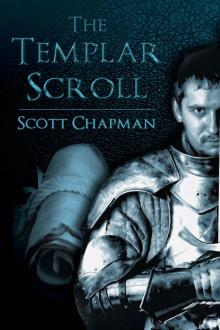 The Templar Scroll: Book six in the series
The Templar Scroll: Book six in the series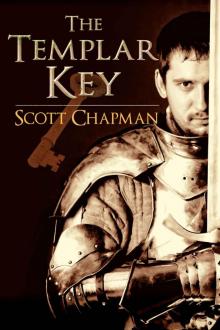 The Templar Key, By Number One Author (Peter Sparke Book 3)
The Templar Key, By Number One Author (Peter Sparke Book 3)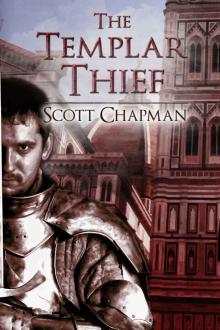 The Templar Thief: Peter Sparke book 4
The Templar Thief: Peter Sparke book 4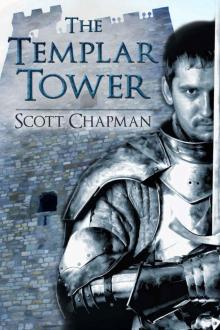 The Templar Tower: Peter Sparke Book Five
The Templar Tower: Peter Sparke Book Five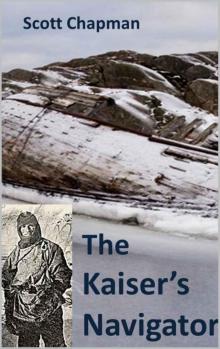 The Kaiser’s Navigator (Peter Sparke Book 2)
The Kaiser’s Navigator (Peter Sparke Book 2)